10 ways to fill the Olympics void
- Published
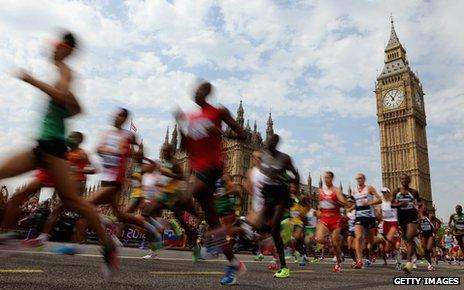
A lot of people will be feeling a little blue after the end of the Olympics. But there are ways to fill the void.
1. Take up an unusual sport
This summer's Games have reminded people that the Olympics isn't just about track and field. Or what goes on in the velodrome and the aquatics centre. Have people ever been so transfixed by taekwondo? And have BMX racing and open-water swimming earned a permanent place in the hearts of the previously uninitiated?
The legacy of the Games is surely about all those children - and grown-ups - who now take up some of the more unusual sports.
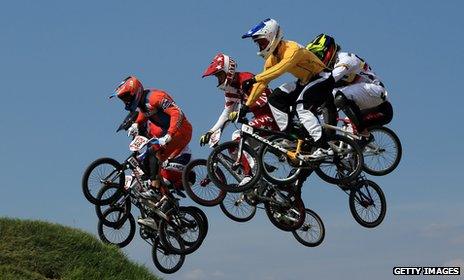
Weeeeeeeee!
People are already taking part more.
According to British Rowing, the latest figures from Sport England's Active People Survey reveal that 48,300 people now row on the water at least once per week in the UK, an increase of more than 10,000 compared with April 2011.
And the same survey shows that 161,000 more people are cycling now than eight months ago.
But there is always room for more.
2. Go to the Paralympics
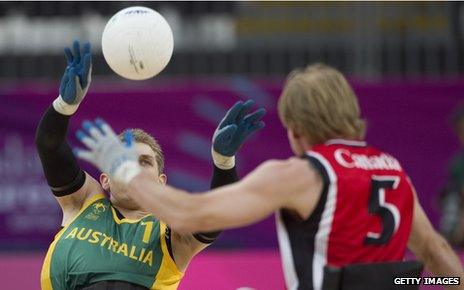
Wheelchair rugby will feature in the Paralympics
Now we are in competitive mood and still have the union jacks and face paint, you could put it to good use by supporting the Paralympics. More than two million tickets have been sold so far and it is tipped to be the first sellout in the history of the games.
"Tickets sales are huge so I guess that's how people think they are going to fill the Olympic void," says Daily Telegraph sports writer Jim White.
"There are a number of the same sports as the Olympics such as the swimming and athletics, but there are new sports too."
Millions will be transfixed by wheelchair rugby - growing in popularity since the 2005 film Murderball - with its crunching collisions and eye-watering intensity.
At the more sedate end of things is boccia - a game where participants attempt to land a ball near a target ball in much the same way as boules.
South Africa's Oscar Pistorius and Britain's David Weir are among the most high-profile athletes, along with double gold medallist swimmer Ellie Simmonds.
But, of course, the Paralympics will fill the void only until 9 September.
3. Get a six-pack
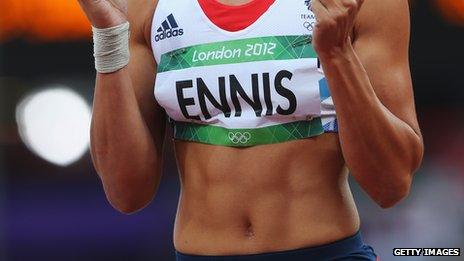
The female six-pack has become ubiquitous
It could be because women athletes tend to wear cropped vests now, but the female six-pack has been a ubiquitous sight during the Games.
Jessica Ennis's toned stomach seems almost as famous as her face. A thousand gym and diet adverts are already trying to persuade ordinary people that they can achieve the same.
"Six-packs are about having very low body fat, that is why so many of the female athletes have them, because they are carrying such a small amount of body fat," says personal trainer Ricardo Macedo.
"Sit-ups won't get you a six-pack. It is about your body overall. Try repeating 100m sprints - short bursts of exercise are good.
"Weights can also help. High repetition is good, 20 to 25 reps on low weights till you really feel the body burn will help."
4. Stage a mini-Olympics in your garden
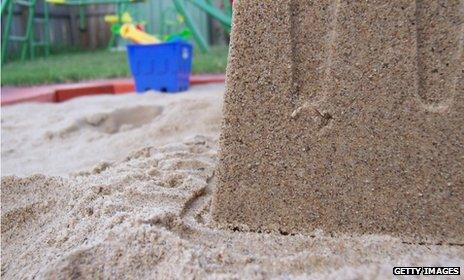
This is how it all started for Greg Rutherford. Well, possibly
Those with decent-sized gardens could organise their own track and field events. A 400m course might involve more than the traditional one lap, but snaking between the washing line and the barbecue will test the competitors' speed and their skill at running corners.
For smaller gardens, why not build a sandpit and try the long jump? Don't be tempted to buy builder's sand - it is coarse and scratchy to jump into. Splash out on some children's play sand for a much softer landing, though at around £3 a 15kg bag the sand pit may have to be very small.
Chariots of Fire must be played on repeat.
5. Pretend your work ID lanyard is a medal
Office workers take a bow. The British workforce kept the greatest show on earth running. Now it's time to take the plaudits.
Get out of your swivel chair and stand at your desk. Feel the podium beneath your feet. Place your hands on the back of your neck, stretch out your fingers and reach for the cord of your employee lanyard.
The lanyard is like a necklace for your work ID. But it has just morphed into something else. Close your eyes. Take a deep breath and trace the line of the lanyard cord as both sides meet above the pectoral muscles.
Close your ears to the ephemeral noise of office life and concentrate on your inner Olympian. Allow the opening bars of Chariots of Fire to wash over you.
Caress your medal. Think about the years of pain, the early mornings training in the rain, the nights where glasses of sauvignon blanc were declined, and all those people who doubted you. Bring the medal to your lips. Hum along to God Save the Queen.
Fight back the tears, knowing that your face is being broadcast around the world. And finally just to check it's all real - bite your medal. You may find it a bit plasticky. Then sit down and get on with your work.
6. Other world championships
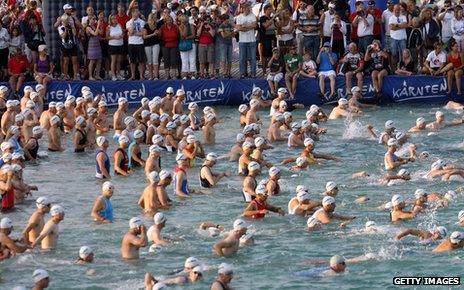
Brrrr. It's quite chilly in there
If you loved watching the Brownlee brothers race in the triathlon and you have a hankering to watch it again, why not try the Iron Man World Championships. "It's just the 50 Shades of Grey mummy porn for sport," suggests White. "It's about pure total pain and people enjoying watching that."
For the uninitiated, Ironman is a super triathlon - a gruelling 2.4-mile swim and 112-mile bike ride, followed by a marathon. The championships take place at Kona, Hawaii, on 13 October.
7. Or for the real iron men…
The World Stone Skimming Championships 2012 will take place on 23 September on Easdale Island in the Inner Hebrides. Refreshingly, this competition is open to anyone of any age and skill level.
Each competitor is allowed three skims using specially selected Easdale slate skimming stones. Easdale was once the centre of the Scottish slate mining industry, and the championship's version of the Olympic stadium is one of the island's disused quarries.
For a skim to qualify the stone must bounce at least three times - it is then judged on the distance achieved before it sinks. It is your chance to become a world champion.
The Pre-Skim Party takes place the night before in the village hall.
8. Visit Yorkshire
Yorkshire has spawned many of the Team GB Olympic medallists, external, so why not take a trip there, drink some of the water and see what it does for you.
From gold medal boxer Nicola Adams's distinctive Leeds accent to Jessica Ennis's less distinctive Sheffield tones, it's hard to escape the Yorkshire factor. The encomia to the sporting prowess of "God's Own County" note that its athletes won more golds than Spain, Brazil or Canada, external despite having a population of just over five million.
The triathlon's now famous Brownlee brothers live in the picturesque village of Bramhope. When gold medallist Alistair Brownlee was recovering from injury last year he talked of counting the cars that drove through Bramhope to ease the boredom. There are very few cars.
9. Get ready for Rio
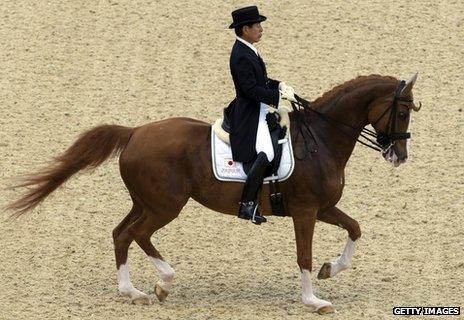
Hiroshi Hoketsu proving there's no need to hang up the dressage boots just yet
Rower Helen Glover only started rowing in 2008 - four years later she has an Olympic gold. It is not too late for a new sporting hero to be discovered.
In her favour, Glover was already fit - not only a PE teacher but also a national standard hockey player with a physique that stood out to the rowing officials who spotted her.
But which sport might the ordinary person be able to master?
The trick perhaps, is to look for sports where youth is not essential - giving years, possibly even decades, in which to get up to the Olympic standard.
"It absolutely has to be shooting or equestrian," says White. "They are good ones for the golden oldies. In shooting you just need a steady hand and 20/20 vision, I guess."
Someone calculated there were 187 athletes over 40 at this year's games, including the oldest, Japanese dressage competitor Hiroshi Hoketsu at 71.
Britain's oldest gold medal winner, 54-year-old Nick Skelton, was part of the showjumping team.
10. Be grumpy/miserable/unfriendly

Looking on the bright side, a favourite British hobby
The last dinner party guests have left. The music has been turned off and the party is over. After a fortnight spent being friendly, smiling ambassadors of the UK is it time for British people to take a big sigh and be miserable for a bit?
The British spectators seem to have impressed. Bert le Clos, the proud father of South African swimmer Chad le Clos, exuberantly thanked the public for their support and friendliness during an interview with Clare Balding. Ian Thorpe was impressed with the home crowds who cheered everyone, Team GB or not.
Slightly more grudgingly, The Australian, external news website also paid tribute to the friendliness of Brits. "As awful as it is to admit, London 2012 was bigger, slicker, almost as friendly and more thoughtfully planned than Sydney in terms of the legacy it will leave the host city," said one article.
But how long can this happy feeling of friendliness and pride last?